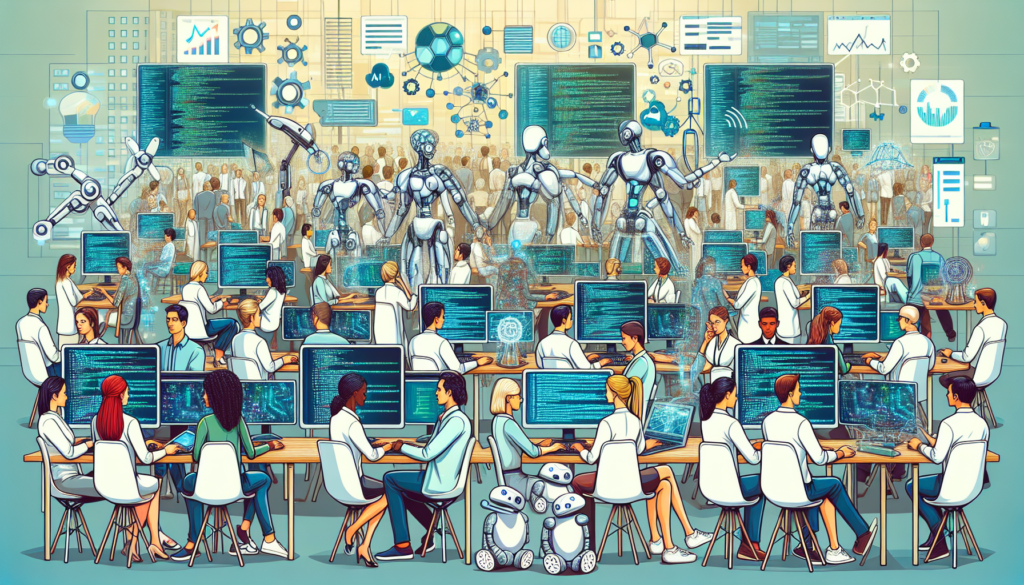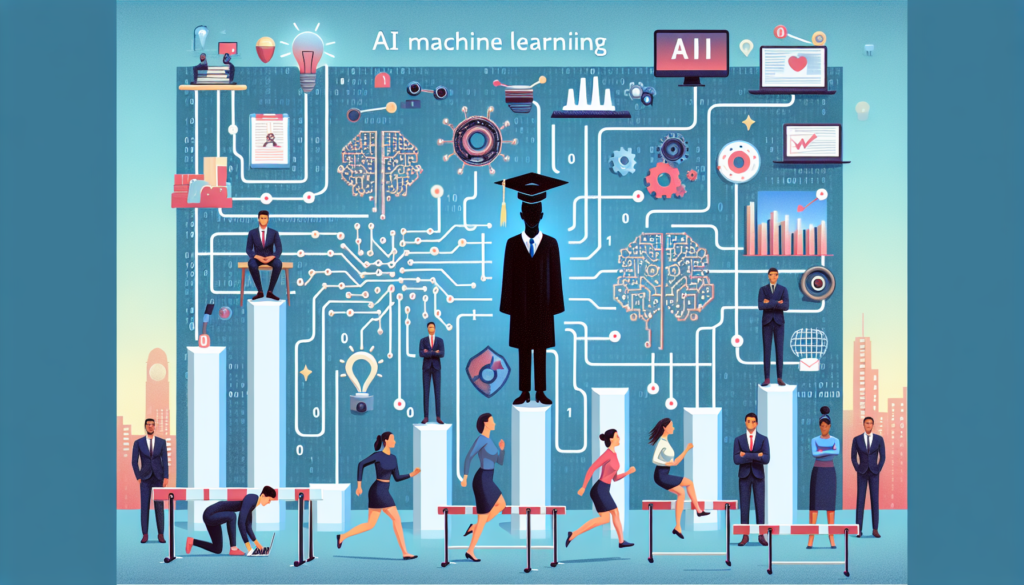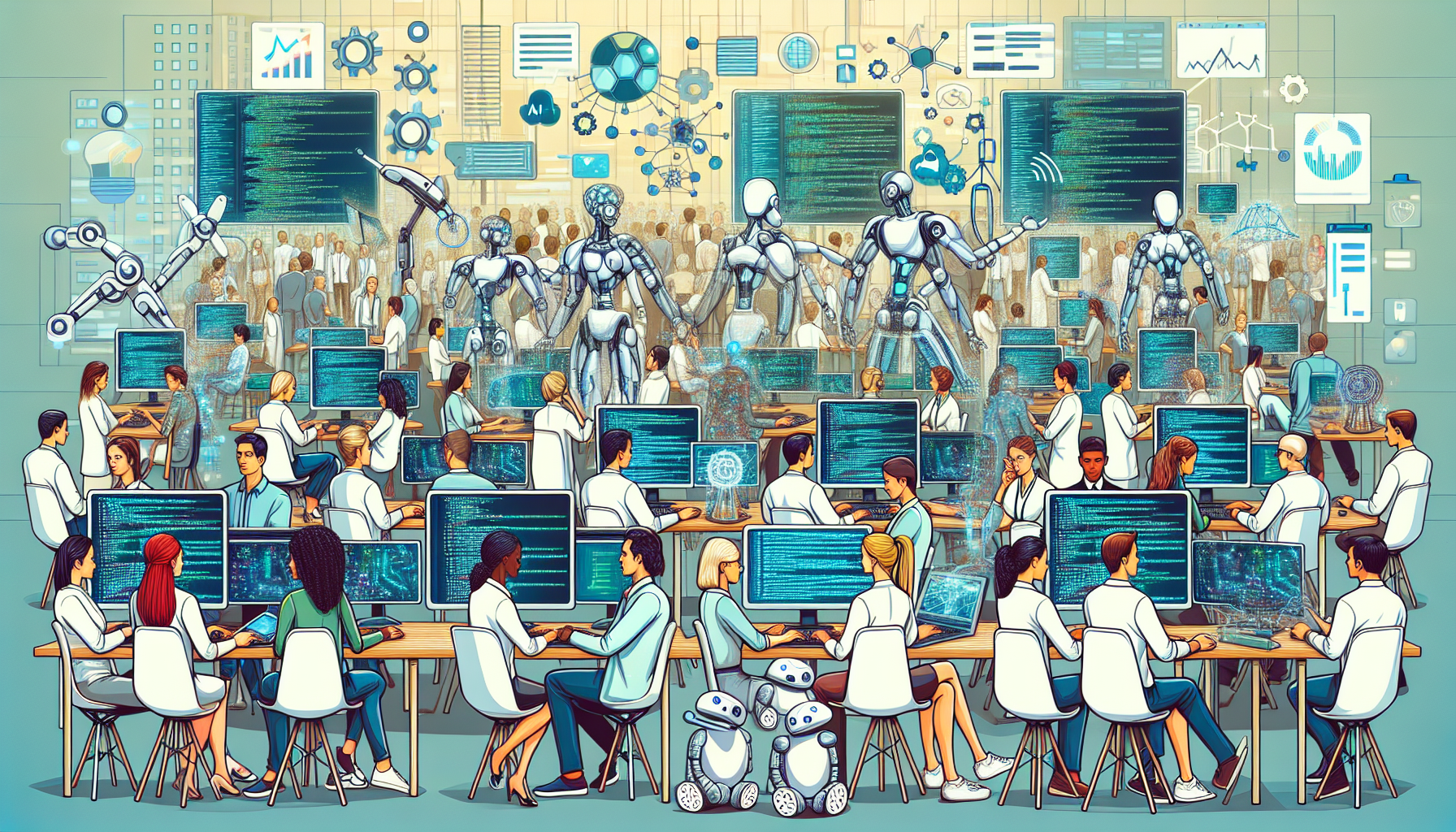Are you intrigued by the immense potential and rapid advancements in the field of AI machine learning? Wondering if pursuing a career in this domain is a wise decision? Look no further as we explore the question: Is AI machine learning a good career? In this article, we will delve into the various aspects of this fascinating industry, highlighting the skills required, growth opportunities, and the impact of AI on different sectors. So, if you’re curious to uncover the prospects of a career in AI machine learning, read on!
Demand for AI and Machine Learning professionals
Growing job market
If you’re considering a career in AI and Machine Learning, you’re in luck! The demand for professionals in this field is rapidly growing. With advancements in technology and the increasing need for automation and data analysis, companies across various industries are eager to hire individuals with expertise in AI and Machine Learning. From healthcare to finance, retail to manufacturing, and transportation to research, the applications of AI and Machine Learning are vast, creating a wide range of job opportunities.
High salary potential
One of the attractive aspects of pursuing a career in AI and Machine Learning is the high salary potential. As the demand for professionals in this field continues to rise, companies are willing to offer competitive compensation packages to attract top talent. The combination of technical skills, mathematical knowledge, and the ability to analyze and interpret data makes AI and Machine Learning professionals highly sought after. With experience and expertise, you can expect to earn a lucrative salary that rewards your efforts and contributions to the industry.
Diverse career opportunities
When it comes to AI and Machine Learning, the career possibilities are diverse. Whether you’re interested in developing cutting-edge algorithms, analyzing data to derive valuable insights, or working on research and development projects, there are various roles that cater to different skill sets and interests. Some common job titles in this field include Data Scientist, Machine Learning Engineer, AI Researcher, Business Intelligence Developer, and AI Consultant. This diversity allows you to choose a career path that aligns with your passions and strengths, ensuring a fulfilling professional journey.
Skills required in AI and Machine Learning
Strong programming skills
To excel in AI and Machine Learning, strong programming skills are essential. Proficiency in programming languages such as Python, R, and Java is crucial for building and implementing machine learning algorithms, data analysis, and developing AI models. The ability to write clean and efficient code will help you in creating robust solutions and effectively integrating AI technologies into existing systems.
Mathematical and statistical knowledge
A solid foundation in mathematics and statistics is paramount in AI and Machine Learning. Understanding concepts like linear algebra, calculus, probability, and statistics enables you to tackle complex problems and apply mathematical models to analyze data. This knowledge forms the basis for building and optimizing machine learning algorithms and helps in interpreting the results.
Data analysis and interpretation
AI and Machine Learning revolve around data. Being able to analyze and interpret data is crucial in understanding patterns, trends, and insights that drive decision-making. Proficiency in data manipulation, data visualization, and data preprocessing techniques allows you to extract meaningful information from large and complex datasets. This skill enables you to make informed decisions and contribute to the development of AI models and solutions.
Understanding of algorithms and concepts
Having a strong understanding of algorithms and concepts is essential in AI and Machine Learning. Familiarity with supervised and unsupervised learning algorithms, neural networks, deep learning, and reinforcement learning allows you to apply appropriate methodologies to solve real-world problems. Knowing the strengths and limitations of different algorithms enables you to select the most suitable approach for a given task, ensuring efficient and effective implementation.

Potential challenges and risks in AI and Machine Learning careers
Continuously evolving field
One of the biggest challenges in AI and Machine Learning careers is the rapidly evolving nature of the field. Technology advances at a rapid pace, and new algorithms, techniques, and frameworks emerge frequently. Keeping up with the latest trends and developments requires continuous learning and staying updated with the latest research papers, conferences, and industry news. However, this challenge also presents exciting opportunities for growth and innovation, as you have the chance to be at the forefront of technological advancements and contribute to groundbreaking discoveries.
Ethical concerns and biases
As AI and Machine Learning become increasingly integrated into society, ethical concerns and biases arise. The algorithms and models developed may inadvertently perpetuate biases in data, leading to discriminatory outcomes. It is crucial for professionals in this field to prioritize ethical considerations, ensuring fairness, transparency, and accountability in the design and implementation of AI systems. Addressing these concerns and striving for ethical AI is essential to create an inclusive and equitable society.
Job automation
While AI and Machine Learning offer tremendous benefits, there is a concern about job automation. As AI technology advances, certain tasks and jobs may become automated, leading to potential job displacement. However, it is important to note that AI and Machine Learning also create new job opportunities. By embracing these technologies and acquiring the necessary skills, individuals can pivot their careers to adapt to the changing job market, ensuring continued professional growth and development.
Difficulties in acquiring expertise
Becoming an expert in AI and Machine Learning requires significant effort and dedication. The field is highly technical and involves complex mathematical and algorithmic concepts. Acquiring the necessary knowledge and skills may prove challenging and time-consuming, especially for individuals without a strong background in computer science or mathematics. However, with perseverance and a structured learning approach, anyone with a passion for AI and Machine Learning can overcome these difficulties and succeed in the field.
Educational requirements and options
Bachelor’s degree in computer science or related field
A bachelor’s degree in computer science or a related field is a common starting point for a career in AI and Machine Learning. This degree provides a solid foundation in programming, mathematics, algorithms, and data structures. It equips you with the necessary technical skills to understand and develop AI and Machine Learning systems. Many universities offer specialized programs or tracks in AI and Machine Learning, allowing you to focus your studies on this field.
Master’s or Ph.D. in AI or Machine Learning
For individuals looking to delve deeper into AI and Machine Learning, pursuing a master’s or Ph.D. in the field is a viable option. These advanced degrees provide a comprehensive understanding of the theoretical foundations, advanced algorithms, and cutting-edge research in AI and Machine Learning. They also provide opportunities for hands-on research and collaboration with experts in the field. A master’s or Ph.D. can open doors to more specialized and research-oriented roles in academia, industry, or government organizations.
Online courses and certifications
If you’re unable to commit to a full-time degree program, online courses and certifications provide a flexible and accessible option to acquire AI and Machine Learning skills. Platforms like Coursera, edX, and Udacity offer a wide range of courses and programs that cater to different skill levels and interests. These courses cover topics such as machine learning, deep learning, and natural language processing, allowing you to learn at your own pace and acquire industry-recognized certifications.
Self-study and practical experience
While formal education is valuable, self-study and practical experience also play a crucial role in developing expertise in AI and Machine Learning. Engaging in personal projects, participating in Kaggle competitions, and contributing to open-source projects can help you gain hands-on experience and apply theoretical knowledge to real-world problems. Building a strong portfolio of projects demonstrates your skills and passion to potential employers.

Industry Applications of AI and Machine Learning
Healthcare
AI and Machine Learning have tremendous potential in healthcare. From analyzing medical images and diagnosing diseases to predicting patient outcomes and personalized treatment recommendations, AI can improve the accuracy, efficiency, and accessibility of healthcare services.
Finance
In the finance industry, AI and Machine Learning are used for risk analysis, fraud detection, algorithmic trading, and customer service. By analyzing vast amounts of financial data, AI systems can identify patterns and trends, leading to more informed decision-making and improved investment strategies.
Retail
AI and Machine Learning are revolutionizing the retail industry by enhancing customer experiences, optimizing supply chain management, and enabling personalized marketing. Recommendation systems, chatbots, and demand forecasting models are just a few examples of how AI is transforming the retail landscape.
Manufacturing
AI and Machine Learning play a crucial role in streamlining manufacturing processes, improving product quality, and optimizing supply chain operations. Predictive maintenance, quality control, and demand forecasting are some applications that help manufacturers increase efficiency and reduce costs.
Transportation
The transportation industry benefits from AI and Machine Learning in various aspects, including route optimization, traffic management, and autonomous vehicles. AI algorithms can analyze traffic patterns, predict congestion, and optimize routes, improving the efficiency and safety of transportation systems.
AI and Machine Learning in Research and Development
Scientific discovery
AI and Machine Learning have the potential to accelerate scientific discovery. By analyzing vast amounts of scientific data, AI algorithms can identify patterns, predict outcomes, and generate insights that aid researchers in developing new hypotheses and conducting experiments.
Drug development
In the field of drug development, AI and Machine Learning are revolutionizing the process of discovering and designing new drugs. AI models can analyze molecular structures, predict drug efficacy, and identify potential side effects, reducing the time and cost associated with traditional trial-and-error methods.
Optimization
AI and Machine Learning techniques are used for optimization problems in various industries, such as logistics, manufacturing, and resource allocation. By applying algorithms and optimization models, AI systems can find the most efficient and cost-effective solutions, optimizing complex processes and maximizing productivity.
Predictive modeling
Predictive modeling is a valuable application of AI and Machine Learning across multiple domains. By analyzing historical data, AI models can make predictions about future outcomes, enabling proactive decision-making and mitigating potential risks. This application is used in finance, insurance, marketing, and many other fields.
Job roles in AI and Machine Learning
Data Scientist
Data scientists are responsible for gathering, cleaning, and analyzing large datasets to extract insights and actionable information. They use algorithms and statistical techniques to identify patterns, develop predictive models, and make data-driven recommendations.
Machine Learning Engineer
Machine Learning engineers focus on developing and implementing machine learning algorithms and models. They work closely with data scientists and software engineers to design robust and scalable solutions that can process large volumes of data and make accurate predictions.
AI Researcher
AI researchers are involved in cutting-edge research and development of new AI algorithms and models. They explore novel approaches, conduct experiments, and publish their findings in academic journals and conferences. Their work drives innovation and pushes the boundaries of AI technology.
Business Intelligence Developer
Business Intelligence developers leverage AI and Machine Learning techniques to analyze and interpret data for business insights. They design and develop data visualization tools, dashboards, and reporting systems that enable decision-makers to understand and act upon data in real-time.
AI Consultant
AI consultants provide strategic guidance and consulting services to organizations looking to implement AI and Machine Learning solutions. They assess business needs, identify opportunities, and develop roadmaps for successful adoption and integration of AI technologies.
Future trends in AI and Machine Learning
Increased automation and integration
As AI and Machine Learning technologies continue to advance, we can expect increased automation and integration across industries. Tasks that are currently performed by humans may become automated, allowing professionals to focus on more complex and strategic tasks. AI systems will become seamlessly integrated into various aspects of our lives, augmenting our capabilities and enhancing our productivity.
Exploring new applications
As AI and Machine Learning become more widely adopted, explorations of new applications and domains will continue to expand. From agriculture to cybersecurity, education to environmental sustainability, there are endless possibilities for AI and Machine Learning to make a positive impact on society. Unlocking these opportunities requires interdisciplinary collaborations and innovative thinking.
Ethical considerations and regulations
As AI and Machine Learning become increasingly integrated into society, ethical considerations and regulations will play a crucial role. The responsible development and deployment of AI systems that adhere to ethical guidelines and respect privacy and security are essential. Governments, organizations, and industry leaders will work together to establish robust frameworks that ensure transparency, fairness, and accountability.
Growing demand in the global market
AI and Machine Learning market trends
The global market for AI and Machine Learning is experiencing significant growth. According to reports, the market is expected to reach billions of dollars in the coming years, driven by the increasing adoption of AI technologies across industries. This growth presents immense opportunities for professionals in this field, with companies actively seeking individuals with AI and Machine Learning skills to help them navigate the digital transformation.
Opportunities in emerging economies
While the demand for AI and Machine Learning professionals is high in established economies, emerging economies are also rapidly embracing these technologies. As these countries strive to grow their digital infrastructure and industries, there is a growing need for skilled professionals to drive innovation and development. This presents exciting opportunities for individuals looking to work in diverse and dynamic environments.
International collaborations and partnerships
As AI and Machine Learning become global phenomena, international collaborations and partnerships are crucial for knowledge exchange and breakthrough innovations. Researchers, organizations, and governments from different countries are coming together to share expertise, resources, and best practices. This collaborative approach facilitates faster progress, accelerates innovation, and addresses societal challenges on a global scale.
Conclusion
Pursuing a career in AI and Machine Learning can be highly rewarding and lucrative. With the growing demand for professionals in the field, a diverse range of career opportunities awaits those with the right skills and expertise. While challenges such as staying updated with the continuously evolving technology and addressing ethical concerns exist, the potential for impact and the chance to contribute to society make this field worthwhile. Continuous learning and growth are essential in keeping up with the advancements, and the positive contributions made by AI and Machine Learning professionals can shape the future in impactful ways. So, if you have a passion for technology, analysis, and problem-solving, consider exploring a career in AI and Machine Learning – the possibilities are endless!
